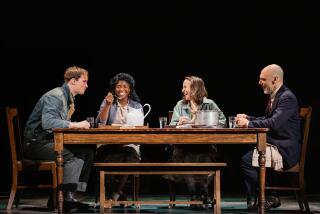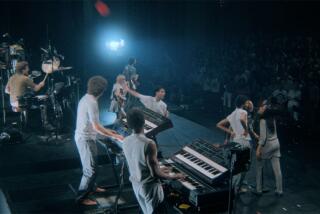Acoustic Americana
- Share via
Every instrumental sound that came from the Universal Amphitheatre stage for three hours Sunday night came from strings. Stretched taut on mandolins, fiddles, guitars, basses and banjos, gut and steel were plucked, picked and strummed, bowed, hammered, slapped and bent. Not even such folk-permitted instruments as tambourines, pipes, squeezeboxes and harmonicas intruded in this world. Nothing was plugged into an amplifier. Drums? You’ve got to be kidding.
Welcome to “Down From the Mountain,” the concert extension of the music from the Coen brothers’ picaresque parable, “O Brother, Where Art Thou?” That 2000 movie’s soundtrack of rural music from the Depression-era South has become one of the big success stories of the last year, starting out with zero commercial expectations and going on to sell more than 4 million albums. It has five Grammy nominations, including one for album of the year.
For the record:
12:00 a.m. Feb. 21, 2002 FOR THE RECORD
Los Angeles Times Thursday February 21, 2002 Home Edition Main News Part A Page 2 A2 Desk 2 inches; 38 words Type of Material: Correction
Concert review--A review of the “Down From the Mountain” concert in Tuesday’s Calendar incorrectly stated that Tim Blake Nelson was the only actor in “O Brother, Where Art Thou?” to do his own singing in the movie. Cast member Chris Thomas King also sang his songs in the film.
This could be considered the Appalachian branch of the Buena Vista Social Club. There are obvious parallels between these two phenomena, both of which revive a tradition under the supervision of an eclectic producer (T Bone Burnett in this case) and serve it up to a broad audience. “O Brother” allows casual listeners to participate in the genre without rolling up their sleeves and thumbing through the bluegrass bins or packing the family off to a folk festival.
This tends to offend folk snobs, who feel like villagers overrun by tourists, but it’s hard to complain about wide exposure for a cultural treasure such as Ralph Stanley. Still, it doesn’t justify the air of self-congratulation that crept into master of ceremonies Bob Neuwirth’s comments--at times it seemed like the political convention of a third party that suddenly finds itself leading the polls--especially when the music itself made its own case so eloquently.
The soundtrack album is just an hour long, and for this staging (which is currently on its first extended tour, with a likely return to Southern California in the summer) those songs served as a framework for a sprawling survey of acoustic Americana, from mud-raw (the a cappella elders the Fairfield Four) to city slick (the Nashville Bluegrass Band).
The movie itself exudes a male sensibility, but Sunday’s concert was, among other things, a showcase for female singers, with a regal Emmylou Harris heading a cast that also featured Alison Krauss, Nancy Blake (briefly), Patty Loveless (filling in for Gillian Welch), and Sharon and Cheryl White (of the group the Whites). And waiting in the wings, so to speak, are the Peasall sisters, three tots with twang ages 8, 11 and 14, who closed the first half of the concert with their two “O Brother” contributions.
Dan Tyminski, from Krauss’ band Union Station, did his version of “I Am a Man of Constant Sorrow,” the film’s key song and the recording that spurred the album’s success. The Universal stop also marked veteran blues-folk figure Taj Mahal’s first night on the tour and featured “O Brother” co-star Tim Blake Nelson--the only actor who did his own singing--delivering “In the Jailhouse Now.”
It was all crowned by bluegrass patriarch Stanley, alone first for his a cappella “O Death,” then joined by Nashville Bluegrass Band and Loveless and then all the participants.
You might be able to see most of these acts during the course of a year at such rooms as McCabe’s or the Folk Music Center, but the combinations and the sheer concentration of quality artists gave Sunday’s show the weight of a major event and the blissful spirit of a community sing.
More to Read
The biggest entertainment stories
Get our big stories about Hollywood, film, television, music, arts, culture and more right in your inbox as soon as they publish.
You may occasionally receive promotional content from the Los Angeles Times.








